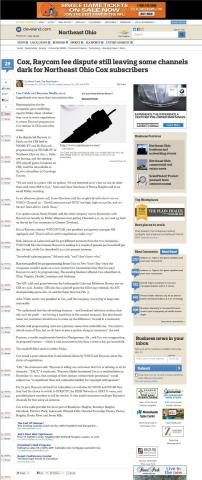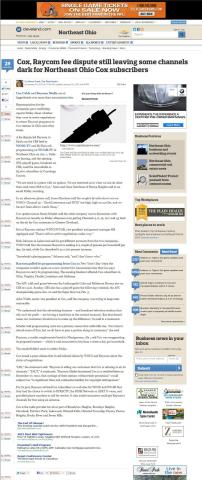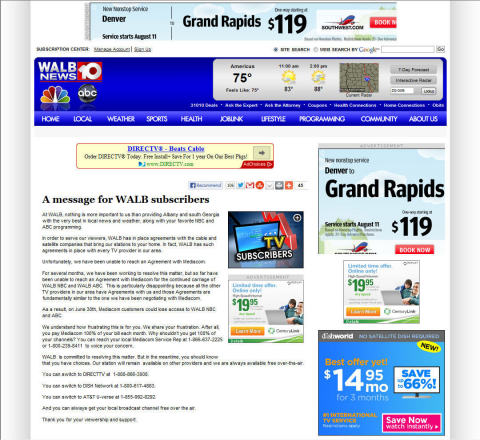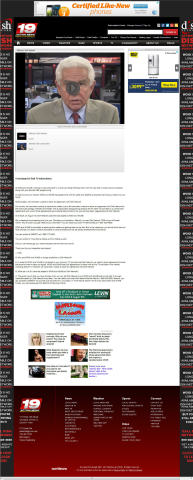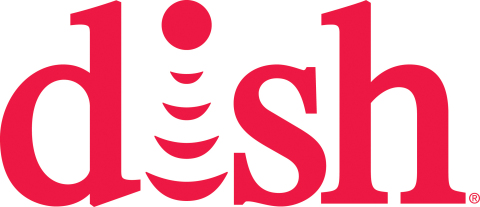ENGLEWOOD, Colo.--(BUSINESS WIRE)--In its eighth day of an ongoing blackout by Raycom Media, and amidst the backdrop of a retransmission blackout by CBS on Time Warner Cable for the past week, DISH (NASDAQ: DISH) is calling for Congress to update the outdated local TV carriage rules and protect consumers.
“Since the beginning of the year, Raycom has told its viewers to switch providers no fewer than three times, including twice suggesting DISH as a great choice for consumers, as they play TV providers off of each other using viewers as pawns,” said Dave Shull, DISH executive vice president and chief commercial officer. “Raycom is the poster child of broadcaster manipulation, exploiting outdated retransmission rules to squeeze money from providers, and therefore viewers.”
In January, Raycom was involved in a retransmission blackout with Cox Cable and suggested to its viewers to switch to another provider, including DISH and its competitors. In July, a retransmission dispute with Mediacom led Raycom to again ask viewers to switch. Now, as Raycom speaks to DISH customers, the broadcaster is telling viewers to switch again, including back to Cox Cable.
“The impact of these tactics on consumers should be the focus of retransmission reform in Washington,” said R. Stanton Dodge, DISH executive vice president and general counsel. “The outdated carriage rules have resulted in an historic number of blackouts with millions of subscribers impacted. It is time for reform.”
DISH has introduced a plan to Congress, backed by Time Warner Cable and other video distributors that would protect consumers and reduce the number of blackouts.
“We are asking that pay-TV providers be allowed to temporarily import network content from another market if there are blackouts during retransmission negotiations,” explained Dodge. “This is not a perfect solution, but one that keeps the consumer’s interests at the forefront and prevents disrupting their lives. It partially levels the playing field. We aren’t asking for an advantage, just fair rules. Right now, programmers hold all of the power and they aren’t using it for the public interest, they are using it strictly for profit and to the detriment of the American consumer.”
According to data from SNL Kagen, a leading industry research firm, broadcast retransmission fees rose a estimated 372 percent from 2008 to 2012, and are anticipated to rise more than 1,100 percent by 2018, from $500 million in 2008 to $6.1 billion.
“As pay-TV providers across the board watch our subscriber base level off, we do not have the profit margins to absorb those costs and are forced to pass them on to consumers,” added Shull. “The people left in the dark are viewers. I think consumers are fed up, and I don’t blame them.”
To read Raycom’s suggestion to viewers to switch providers, see the following links:
January: Raycom asks Cox Cable viewers to switch
http://www.cleveland.com/business/index.ssf/2013/01/cox_raycom_fee_dispute_still_l.html
July: Raycom asks Mediacom viewers to switch
http://www.walb.com/story/22489793/a-message-for-walb-subscribers
August: Raycom asks DISH customers to switch
http://www.19actionnews.com/category/265597/attention-dish-subscribers
About DISH
DISH Network Corporation (NASDAQ: DISH), through its subsidiary DISH Network L.L.C., provides approximately 14.014 million satellite TV customers, as of June 30, 2013, with the highest quality programming and technology with the most choices at the best value, including HD Free for Life®. Subscribers enjoy the largest high definition line-up with more than 200 national HD channels, the most international channels, and award-winning HD and DVR technology. DISH Network Corporation's subsidiary, Blockbuster L.L.C., delivers family entertainment to millions of customers around the world. DISH Network Corporation is a Fortune 200 company. Visit www.dish.com.

